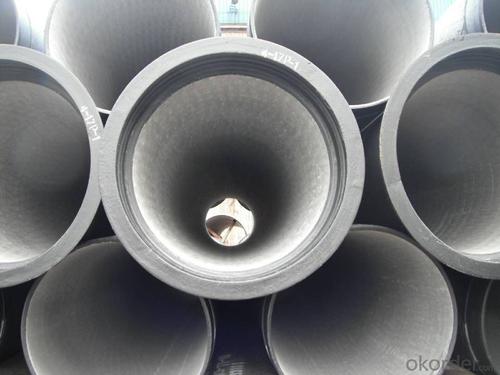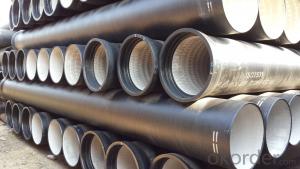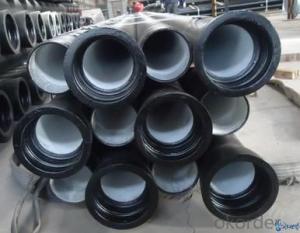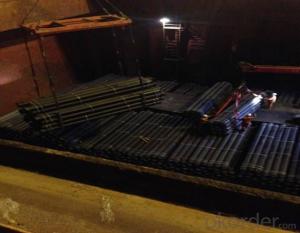DUCTILE IRON PIPE DN500
- Loading Port:
- China Main Port
- Payment Terms:
- TT OR LC
- Min Order Qty:
- -
- Supply Capability:
- -
OKorder Service Pledge
OKorder Financial Service
You Might Also Like
Specification:
1) The standard of pipe: ISO2531:1998, K9
2) Effective length: 6m
3) Inner cement line: Portland cement line as per ISO4179
4) Zinc coating: at least 130g/m2 as per ISO8179
5) Bitumen painting: at least 70um as per ISO8179
6) With 100% quantity of NBR ring, or SBR ring, or EPDM ring as per ISO4633
7) DN80mm-800mm
8) High strength, lighter than grey iron, good corrosion resistance, no furring, small flow resistance, easy fixing, long life tome about 100 yeas
9) Produced by Hangzhou chunfeng machine
10) Checked by automatic inspection equipment
11) Composition:
Chemical composition | |||
Chemical composition | Ductile Cast Iron Pipe (%) | Grey iron pipe (%) | Steel pipe (%) |
C | 3.5-4.0 | 3.2-3.8 | 0.1-0.2 |
Si | 1.9-2.6 | 1.4-2.2 | 0.15-0.4 |
Mn | 0.15-0.45 | 0.4-0.6 | 0.3-0.6 |
P | ≤0.06 | ≤0.3 | 0.02-0.03 |
S | ≤0.02 | ≤0.1 | 0.02-0.03 |
Mg | 0.03-0.06 |
|
|
12) Feature:
Mechanical properties | |||
| Ductile Cast Iron Pipe | Grey Iron Pipe | Steel Pipe |
Tensile Strength(Mpa) | ≥420 | 150-260 | ≥400 |
Yield Strength(Mpa) | ≥300 | No Confirmation | No Confirmation |
Bending Strength(Mpa) | ≥590 | 200-360 | ≥400 |
Elongation (%) | ≥10 | Neglected | ≥18 |
Brinell Hardness(HBS) | ≤230 | ≤230 | About 140 |
13) T type mechanical joint
14) Packing: in bulk or container
- Q: What's the difference between cast iron pipe and steel pipe?
- Cast iron pipes (Cast, Iron, Pipe), cast cast pipe. Cast iron pipes are used for water supply, drainage and gas transmission lines. They include cast iron pipes and pipe fittings. Labor intensity is small. According to the casting method, it is divided into continuous cast iron pipe and centrifugal cast iron pipe, in which the centrifugal cast iron pipe is divided into sand mould and metal type two kinds. Divided into gray cast iron pipe and nodular cast iron pipe according to different material. According to the interface form, it is divided into flexible interface, flange interface, self anchored interface, rigid interface and so on. Among them, the flexible iron pipes rubber sealing ring; flange interface cast iron pipe flange fixed in the rubber pad, the flange gasket sealing; rigid interface cast iron pipe socket is large, straight pipe is inserted, sealed with cement, this technology has been basically eliminated
- Q: Can ductile iron pipe be used for bridge crossings?
- Yes, ductile iron pipe can be used for bridge crossings. Ductile iron pipe is known for its strength, durability, and flexibility, making it suitable for various applications, including bridge crossings. Its high tensile strength allows it to withstand heavy loads and vibrations, making it ideal for supporting bridges and handling the weight of traffic. Additionally, ductile iron pipe's flexibility allows it to absorb movements and deformations caused by temperature changes, settling, and other factors, reducing the risk of structural damage and ensuring the longevity of the bridge crossing. Furthermore, ductile iron pipe is resistant to corrosion, making it a reliable choice for bridge crossings where exposure to moisture, chemicals, and other corrosive elements is common. Overall, ductile iron pipe's properties make it a suitable and reliable material for bridge crossings.
- Q: What is the weight of ductile iron pipes compared to other materials?
- Ductile iron pipes are generally heavier compared to other materials commonly used in the construction industry. The weight of ductile iron pipes can vary depending on the specific size and dimensions, but they are typically heavier than materials such as PVC, HDPE, and steel pipes. This increased weight is primarily due to the dense nature of ductile iron, which provides durability, strength, and resistance to corrosion. However, the weight of ductile iron pipes also contributes to the challenges associated with transportation, installation, and handling, requiring appropriate equipment and techniques to ensure safe and efficient installation. Overall, while ductile iron pipes may be heavier than other materials, they offer numerous advantages in terms of longevity and performance in various applications.
- Q: Are ductile iron pipes more resistant to breaks and cracks than other pipe materials?
- Ductile iron pipes generally possess higher resistance to breaks and cracks compared to other pipe materials. Ductile iron, a form of cast iron treated with magnesium, exhibits increased flexibility and reduced brittleness. This enhanced flexibility empowers ductile iron pipes to endure significant pressure and external loads without incurring damage. In contrast to widely-used pipe materials such as PVC, HDPE, or steel, ductile iron pipes excel in strength and durability. They boast higher tensile strength, enabling them to withstand greater forces and pressures without succumbing to failure. Additionally, ductile iron pipes demonstrate superior impact resistance, reducing the likelihood of cracking or breaking when subjected to sudden impacts or external loads. Another advantage of ductile iron pipes lies in their ability to resist corrosion. The material naturally repels rust and remains unaffected by harsh environmental conditions, making it ideal for underground installations or areas with corrosive soils. This corrosion resistance further contributes to the pipes' longevity and overall integrity. Furthermore, ductile iron pipes possess a longer lifespan compared to other pipe materials. They are designed to endure for multiple decades, often exceeding 50 years, with minimal maintenance. This prolonged lifespan decreases the necessity for frequent replacements, resulting in time and cost savings in the long term. However, it is crucial to acknowledge that no material is entirely immune to damage or failure. Proper installation, maintenance, and adherence to industry standards and guidelines are imperative to ensure optimal performance and longevity of ductile iron pipes. Regular inspection and monitoring should also be carried out to identify potential issues or signs of deterioration, facilitating timely repairs or replacements.
- Q: Do ductile iron pipes require cathodic protection?
- Indeed, cathodic protection is necessary for ductile iron pipes. Employing this technique safeguards metallic structures against corrosion by designating them as the cathode in an electrochemical cell. Ductile iron pipes face a high susceptibility to corrosion, particularly in harsh soil environments or when exposed to water that harbors substantial amounts of corrosive elements like chlorides or sulfates. By subjecting the pipe to a direct electrical current, cathodic protection effectively thwarts the innate corrosion process. This approach guarantees the durability and soundness of the ductile iron pipes, thereby diminishing the frequency of repairs or replacements.
- Q: If the ductile iron pipe is broken, can we use rush repair?
- These specifications are also based on the outer diameter of the tube. In daily life, we may also encounter a pipeline rupture, or when it is on the road to repair, excavator accidentally hit PE, PPR water supply and drainage pipeline, as long as a little, can be used to repair the pipeline repair section.
- Q: Can ductile iron pipes be used for submarine pipelines?
- Yes, ductile iron pipes can be used for submarine pipelines. Ductile iron is known for its high strength and durability, making it suitable for various applications, including underwater installations. Ductile iron pipes have been successfully used in the construction of submarine pipelines for several decades. They can withstand the harsh conditions of underwater environments, such as corrosion, pressure, and shifting seabed. Additionally, ductile iron pipes have excellent resistance to external loading, making them ideal for submarine pipelines that need to withstand the weight of water and potential impacts. However, it is important to consider factors such as coating, cathodic protection, and proper installation techniques to ensure the long-term performance and integrity of the submarine pipeline.
- Q: Can ductile iron pipes be used for water treatment facilities?
- Water treatment facilities can utilize ductile iron pipes. Ductile iron, a type of cast iron, boasts improved strength, flexibility, and durability. These characteristics render it suitable for a range of applications, including water treatment facilities. Ductile iron pipes exhibit exceptional resistance to corrosion, a crucial attribute for water treatment facilities where pipes come into contact with various chemicals and water contaminants. They can endure the demanding conditions and chemicals inherent in water treatment processes, ensuring a lengthy lifespan. Additionally, ductile iron pipes possess high tensile strength and can withstand elevated pressures. This makes them ideal for conveying water throughout the facility, encompassing the distribution system, pumping stations, and treatment units. They can handle the required flow rates and pressures without compromising pipe integrity. Furthermore, ductile iron pipes are renowned for their flexibility and resilience. They can tolerate ground movement and other external stresses, diminishing the likelihood of pipe failures and leaks. This proves invaluable in water treatment facilities where pipes frequently traverse diverse terrains and undergo regular maintenance activities. Moreover, ductile iron pipes offer cost-effective advantages over alternative pipe materials such as steel or PVC. They boast an extended lifespan, necessitate minimal maintenance, and exhibit low failure rates, thereby reducing overall operational and maintenance expenses for water treatment facilities. In conclusion, ductile iron pipes provide a dependable and durable solution for water treatment facilities. Their corrosion resistance, high tensile strength, flexibility, and cost-effectiveness render them a suitable choice for transporting water and chemicals within the facility, ensuring efficient and effective water treatment processes.
- Q: How much pressure can the ductile iron pipe socket meet?
- If it is a general installation, you can rest assured, are within the scope of tolerance.
- Q: Can ductile iron pipes be used for firefighting systems?
- Yes, ductile iron pipes can be used for firefighting systems. Ductile iron is a strong and durable material that can withstand high pressures and extreme temperatures, making it suitable for transporting water in firefighting systems. Its ability to resist corrosion and withstand external loads also ensures the long-term reliability and performance of the pipes. Additionally, ductile iron pipes have excellent fire resistance properties, as they do not burn, emit toxic fumes, or contribute to the spread of fire. Therefore, ductile iron pipes are a reliable and commonly used choice for firefighting systems due to their strength, durability, and fire resistance.
Send your message to us
DUCTILE IRON PIPE DN500
- Loading Port:
- China Main Port
- Payment Terms:
- TT OR LC
- Min Order Qty:
- -
- Supply Capability:
- -
OKorder Service Pledge
OKorder Financial Service
Similar products
Hot products
Hot Searches
Related keywords


























